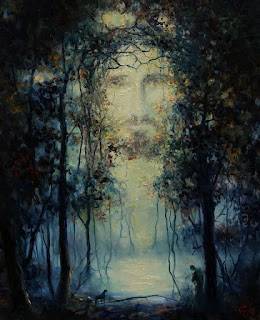1st Sunday after Easter
John 20: 19-29
On
the evening of the first day after the Sabbath, the disciples were together
with the doors locked for fear of the authorities. Jesus came and stood in
their midst and said, “Peace be with you!”And while he said this, he showed
them his hands and his side.
 |
| Grunewald |
Full of joy, the disciples recognized the Lord. And again
he said, “Peace be with you. As the Father has sent me, so I am sending you.” And
when he said this, he breathed on them and said, “Receive the Holy Spirit through which the world will
receive healing. From now on, you shall work in human destinies with
spiritual power so that they shall have
the strength to wrest themselves free from the load of sin, and at the same
time to bear the consequences of their offenses.”
Now Thomas, one of the twelve, called the Twin, was
not there with them when Jesus came. Later the disciples said to him, “We have
seen the Lord.” But he replied, “If I do not see in his hand the marks of the
nails, and do not put my finger in the place where the nails were, and place my
hand in his side, I cannot believe it.”
Eight days later, the disciples were again gathered
in the inner room, and Thomas was with them. Though the doors were locked,
Jesus came and stood in their midst and said, “Peace be with you.” Then he said
to Thomas, “Stretch out your finger and see my hands, and stretch out your hand
and put it into my side. Be not rigid in your heart, but rather feel and trust
in my power in your heart.”
Then Thomas said to him, “You are the Lord of my
soul; you are the God whom I serve.” And Jesus said to him, “Have you found my
power in yourself because you have seen me? Blessed are those who find my power
in their hearts, even when their eye does not yet see me.”
2nd Easter Week, II
April
22, 2020
John
20:19-29
In
today’s reading Christ offers healing and peace to his suffering disciples. “He
breathed on them and said, “Receive the Holy Spirit through which the world
will receive healing.” John 20:22 Madsen
Peace
seems to have to do with a state of calm, equilibrium, and serenity. It is tranquil. Beyond simply not being ‘at war’, peace also has to do
with harmony, accord, goodwill, and acceptance. In The Christian Community’s
communion service, Christ says that he stands filled with peace toward the
world. This is amazing if you think about it. How could He be at peace with all
that is going on, with all the suffering and evil?
I
think one of the key words here is ‘stand.’
Christ is upright in His
relationship to the world. He stands facing the world; he stands by it. He
stands it. He doesn’t turn away from it. Instead, He radiates goodwill toward
all of us. Always. That takes a deep capacity of endurance, which Christ Jesus
earned the hard way.
 |
| Stephen Whatley |
Think
of what He went through. Misunderstood, betrayed by his community, abandoned by
his friends, persecuted, and though innocent, tortured and executed in a
shameful manner, He nevertheless forgave, rose and continues to pour out the
warmth of His love, His tranquility, His harmonious and harmonizing interaction
with the world as it is. But He doesn’t stop there. He asks us what we,
together with Him, can do to bring the world forward, to help it heal and
evolve.
There
is a spiritual law which says that anything that anyone accomplishes while in a
body on earth is deposited in the spiritual treasure chest of humanity and is
then available to all. Having inhabited Jesus’ body with all that He
experienced in it, Christ’s love has already conquered that in the human
constitution which leads to a lack of peace. He has conquered the human being’s
natural egotism, aggression, our “against-ness,” the anger and fear and
opposition that destroy our inner peace. He countered them with the peace that
He generated through acceptance and, primarily through a deep love for
humanity.
 |
| Stephen Whatley |
Because
Christ did so within the frame of a human body and soul, there is a peace-seed
that has been planted deep within every human soul. No matter how rough the
inner human terrain, how stormy the life, how full of the ‘weeds’ of worry,
fear or anger, we can choose to cultivate this seed of peace in us, to nurture
it, grow it in the warm light of His love. For as He says further in the
service, He gives us His peace. Not as the world gives.
Christ’s
peace is dynamic. It both calmly accepts things as they are and at the same
time works to create healing solutions. Christ’s peace and love create unity;
not sameness, but harmonizing the differences, like a chord of notes in music.
We are all sundered, separated from the work of angels, from each other, from
those who have died, even from Him. He waits for us to turn to Him, to ask for
His peace. Praying the Lord’s Prayer is one way of asking.
If
this sounds hard, it is because it is. The embodied Christ achieved what he did
for humankind’s future. It will take us a while to catch up to Him. But
meanwhile, He offers us His abiding love and support, His peace.
Rev.
Cynthia Hindes
Visit our website: www.thechristiancommunity.org































